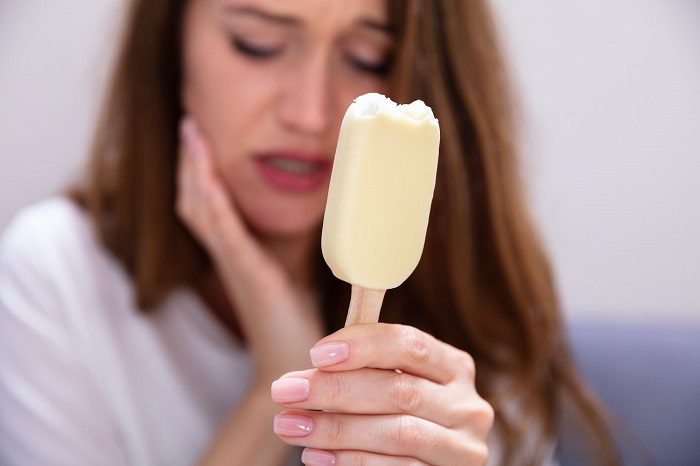If you have ever bitten into a food item and felt a sharp jolt of pain in your tooth, then you are familiar with tooth sensitivity. This intense pain fades quickly after you remove the item from the tooth, but it can feel excruciating in the moment.
Because the feeling is intermittent, many people think they can tolerate or ignore this tooth pain. But tooth pain of any kind is abnormal and could point to a serious underlying oral health problem. Do not hesitate to call your dentist and tell them about this symptom.
You can feel more encouraged to contact your dentist when you know more about this dental condition. Read on to find responses to frequently asked questions regarding the cause, treatment, and prevention of tooth sensitivity.

What Makes My Teeth Feel Sensitive?
If you feel sensitivity pain in your teeth, this means that the enamel, the outer layer of the tooth, has worn down enough to expose underlying dentin. Dentin contains nerves that will transmit a pain signal to the brain if touched by a stimulus, such as food. The pain stops at the removal of the stimulus, but the enamel will continue to remain weak, and the dentin exposed.
Your teeth are designed to bite and chew without issue, but certain factors may cause enamel to erode or wear down over time. Consuming acidic substances can eat away at the enamel, and lapsed oral hygiene may make plaque harm your dental structure.
Underlying dental problems like cavities may create tooth sensitivity pain too. Consult your dentist to find a solution to this uncomfortable symptom.
How Can My Dentist Fix Tooth Sensitivity?
Treatment for tooth sensitivity will depend on the cause of the enamel damage. Enamel will not regrow once lost, but a dentist can help to replace it and restore your dental structure. Since major dental issues could cause this symptom, you should seek urgent attention from your dentist.
For mild cases of tooth sensitivity, a dentist might suggest using a desensitizing toothpaste. The paste contains ingredients that will block nerves from sending pain signals when stimulated. Then you will no longer feel sensitivity pain.
Your dentist can treat cavities that may cause tooth sensitivity. With the dental filling in place, you can see restored dental structure along with relief from sensitivity pain.
A dentist might also replace lost enamel with a dental crown. The ceramic cap will cover the entire surface of the tooth and seal into place. This protects the tooth from further harm and stops stimuli from accessing exposed nerves.
Can I Prevent Sensitive Teeth?
You can reduce your risk for tooth sensitivity by paying attention to your smile and practicing good oral health care. Note any acidic or sugary substances in your diet and avoid them if you can.
Also, stick to a good oral hygiene routine, which includes brushing your teeth twice a day, flossing each day, and attending regular teeth cleanings at your dentist’s office. Find more preventative care for your unique dental structure by talking to your dentist today.
